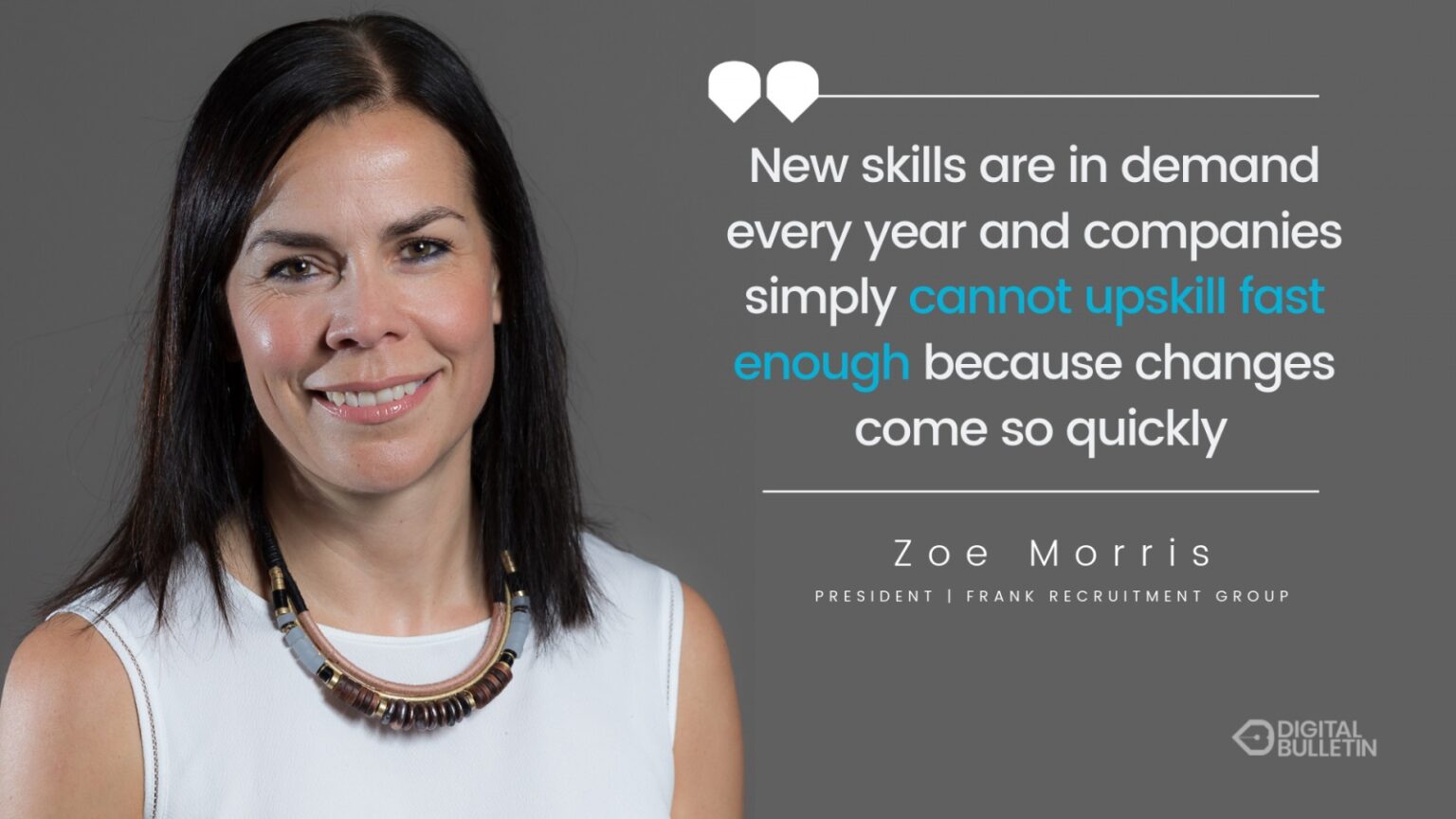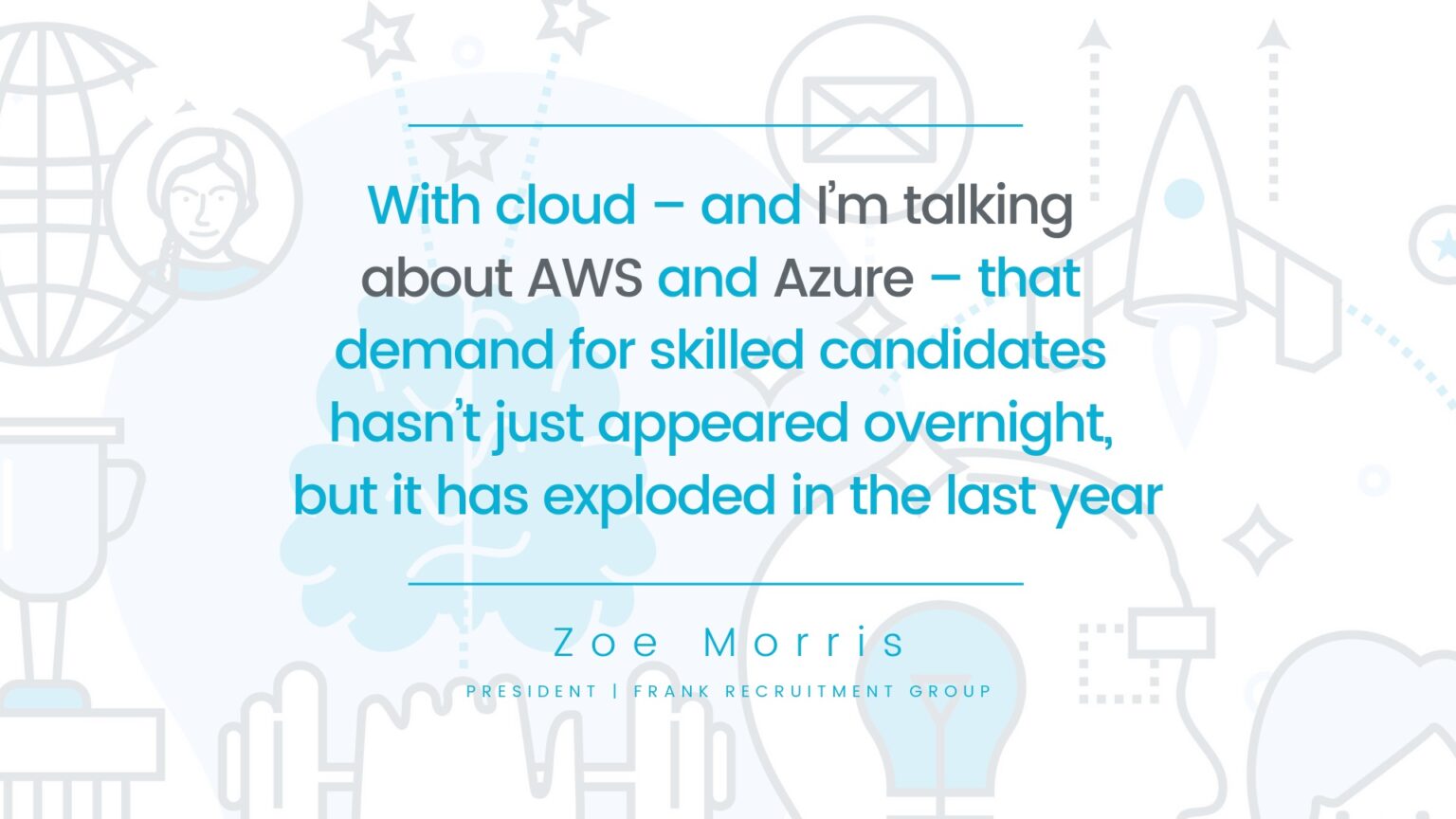
It is generally agreed that the pace of change in the enterprise technology world is on a different level to anything seen before, more rapid even than at the height of the dot com boom. Technologies that just five years ago barely warranted conversation are now changing the way the world’s leading companies are doing business.
The upshot of this is that the skills gap – an age-old problem in the technology space – is becoming more pronounced. The 2017 Global Information Security Workforce Study predicted that as many as 1.8 million IT jobs could go unfilled by 2022.
Frank Recruitment Group is a company helping to plug that gap. For the last 13 years it has helped to connect businesses of all sizes with permanent and contract IT workers. Speaking to Digital Bulletin, Zoe Morris, its President, says the number of available jobs is only trending one way.
“As a business, we are seeing the number of job requisitions from clients increasing every month. The conversations we are having with them can be quite frightening in terms of the number of jobs they are speaking about creating. It can sometimes be difficult to see how we can fulfil all of those roles unless clients are prepared to be flexible about the types of candidates they are willing to consider.”
A highly experienced recruitment professional, Morris agrees that the break-neck speed of progress in the technology arena is having an impact on businesses across the board.

“It’s very well documented that there is a huge skills shortage, in large part driven by the speed at which tech is developing. New skills are in demand every year and companies simply cannot upskill fast enough because changes come so quickly. The pace of change is such that experienced technology professionals cannot pass new qualifications quickly enough. It’s something that is not going away, and we need to think about how we can address it,” she says.
Up front and centre is the proliferation and growth of cloud, an area in which Frank Recruitment has seen demand increase markedly.
“With cloud – and I’m talking about AWS and Azure – that demand for skilled candidates hasn’t just appeared overnight, but it has exploded in the last year, it has sky-rocketed. In the last quarter Azure posted record growth, while AWS is worth more than the global CRM market, which is absolutely crazy. The scale of candidates just doesn’t exist at the moment,” Morris comments.
“We launched a brand purely for AWS experts in May 2018 and we already have 200 consultants globally just servicing AWS requirements for our clients. What we’re seeing is that because it’s such a new technology, a lot of our clients want permanent candidates.”
Against that backdrop, demand for skills in ‘future technology’ areas are also on the rise, and only likely to ascend further in 2019. “Companies are really beginning to understand the value and importance of data and the need to protect it, so skills in the big data space are in high demand. That is a driver for the job market and is creating enormous demand for security experts and analysts who can help companies get commercial value out of the data they hold and ultimately help the businesses be more efficient.
“AI and machine learning skills are massively in demand, while automation is one of the next big things in the industrial movement and there are not enough skilled workers at the bleeding edge who can facilitate this. I don’t think people are going to be completely replaced by AI and machine learning but an increasing number of companies have them on their agenda. They just hasn’t been around long enough to develop a big enough pool of candidates. It is very much a candidate-driven market, which in turn pushes up salaries and competition. It’s a war on supply.”
What is also crucial to progress is the relationship between academia and enterprise, although Morris adds the caveat that it is nigh-on impossible to train people for jobs that are either in their infancy or don’t actually yet exist.
“The education sector needs a complete overhaul; it is fair to say that a lot of the jobs the future generation will be asked to do don’t exist yet, but the way we are teaching students hasn’t changed in a long time. If you look at the science and maths subjects, you wouldn’t say there is a real focus on technology. That is going to take years to address and businesses and technology companies have to drive that by creating partnerships with colleges and universities, which is something that is actually happening more and more.
“A lot of senior technology leaders are spending a lot of their own personal time on this, whether that’s lectures or having partnerships with academia. It is definitely on the agenda of a lot of the consultancies and banking clients. Work placements are also really important, particularly in the UK where a lot of the university courses have an industrial placement year. The more technology companies can offer them, the more capable people they are likely to get through the door when they leave university.”
Frank Recruitment has itself established an intake programme from universities, with around 25 industrial placement students joining its London and Newcastle offices in each of the last three years.
“They work with us for a year and the aim is once they’ve finished their course a year later they will come back and work with us again. By doing that they are already engaged, they know the company and have a sense of purpose. If companies can do that they will beef up their skills and almost start a conveyor belt of talent,” says Morris.
In addition, off the back of conversations with the likes of AWS and Salesforce, Frank Recruitment has set up technology academies in both the UK and the United States, with graduates or second jobbers put through an interview and a 12-week training course, at the end of which they can be placed with clients. Morris says the feedback from those clients has been hugely positive.
But in such a competitive market attracting talent is only half the battle, with companies running the risk of losing their best staff to their competitors.

“Money obviously talks but there is so much more choice and candidates are looking for a number of factors. Brand is certainly important, so companies with a good reputation have an advantage, and it is important they can really explain a clear vision to candidates. Salesforce does a great job of using its agenda to attract candidates, for example. It has a very well-known CSR agenda and candidates can really buy into that. Employees want to be at a company where they can feel they are really adding value to the wider goals of society.
“We live in a society where it is so easy to judge because the flow of information is so easy to access. People want to be associated with good brands because it is all over LinkedIn, Glassdoor and other news outlets. Choices that people make can affect future career choices because there is an expectation that candidates make informed decisions.
“Remote working and flexibility is certainly an expectation, especially in the world of technology. People working in this industry don’t tend to want business as usual 9-5 environments and once companies get people into their business they have to then invest in them. IT candidates want to be trained, they want to make sure their skills are up to date, and they want to remain relevant.”
Clearly, training is a hugely important piece of the retention puzzle, and companies need to think seriously about how they are presenting these opportunities to its employees. Today’s workers are unlikely to be satisfied by PowerPoint presentations or long, drawn out tutorials. Fun, engaging and genuinely value-adding programmes are expected. This is not just advice that Frank Recruitment is giving to its clients, but rather an approach it has adopted internally.
“We employed a Global Head of Learning and Development (L&D) and he has revolutionised how we deliver our training and how we engage our workforce. What we are trying to do is create a proposition where candidates know if they come here they’re going to get world class training,” says Morris.
“The industry needs to map out where the gaps are because there is no point trying to map out a training plan which is very much based internally around learning and development. One of the good things about our Global Head of L&D is that nothing was created until he’d gone out and sat with all of the leaders of the business. The approach is that he will teach and train what is needed, not just put out a corporate training course.
“So, it is important that companies get down to grass roots level and find out what the business actually needs. It also has to be digestible, people don’t have the time to go on week long training courses, and people learn in different ways so that has to be taken into account. These could be workshops, online modules, webinars – there has to be a selection.”
Looking forward, Morris says companies will have to increase their spending on IT and technology recruitment over the next 12 months and beyond, which is ultimately good news for Frank Recruitment.
“We are lucky that all of the markets we operate in have huge potential for growth. I see the biggest opportunity in the cloud space in the short and medium term. AWS and Azure are seeing unprecedented growth and an insatiable demand for skills,” she concludes.
“Our Jefferson Frank brand is only nine months old but is going to become a really significant part of the business. I also think our European office expansion will continue and we have a big opportunity to continue to grow in the US. It is very exciting and all of the vendors are very positive around future projections.”


